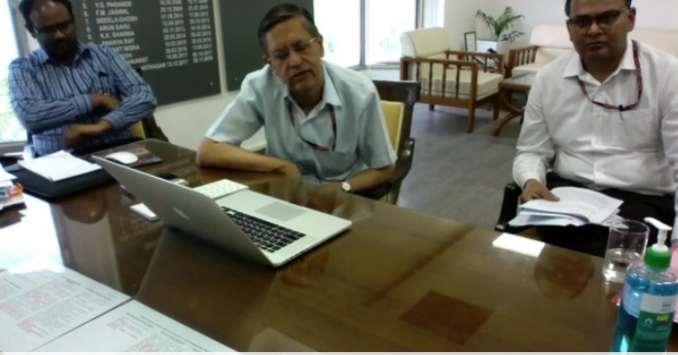DG Systems calls for blockchained KYC in EXIM cargo customs clearance
June 1, 2020: Sandeep Kumar, Directorate General of Systems & Data Management, Central Board of Indirect Taxes & Customs, urged freight forwarders for the creation of a blockchain-based centralized database of all importers and exporters to facilitate trade through digitization and public-private partnership (PPP).

June 1, 2020: Sandeep Kumar, Directorate General of Systems & Data Management, Central Board of Indirect Taxes & Customs, urged freight forwarders for the creation of a blockchain-based centralized database of all importers and exporters to facilitate trade through digitization and public-private partnership (PPP).
This was communicated during the recent webinar on “Digital Transformation through Paperless Initiatives in Customs Clearance” organized by Federation of Freight Forwarders’ Associations in India (FFFAI) in the backdrop of ongoing Covid-19 pandemic and lockdown.
Kumar called on FFFAI chairman AV Vijaykumar to work on blockchain technology for achieving the centralized KYC and also to achieve further uniformity in various processes involved in customs clearance of EXIM cargo.
Anupam Prakash, EDG, Systems along with Kshitij Jain, joint commissioner, Systems unveiled future endeavour of the directorate of systems by carrying out various upgradations in the system which will result in a high degree of paperless transaction. He explained the recent online module which has been introduced for carrying out import clearance further. He also conveyed that a similar module is being worked out for export with a lot of features like the import side.
Efforts of FFFAI
FFFAI has already given a proposal to the ministry of finance and the ministry of commerce in this regard. It was also suggested that similar to import and LEO documents if it is sent in PDF format along with a copy to the shipping line and load port the TR-1 and TR-2 can be done away with. Registration of goods should be immediately after the entry of goods in the customs area along with uploading with Annexure-C is also recommended for minimizing handling of export goods.
AV Vijaykumar, chairman, FFFAI conveyed that the federation with its outreach to every nook and corner of the country is geared up for creating the centralized KYC database of importers and exporters transacting through customs, which will help to create a secure working environment.
Auto monitoring and escalation mechanism to check the pendency in import bill of entries and export shipping bills: FFFAI suggested that for better monitoring of pendency for assessment and examination, the Customs EDI system software should be designed in a manner so that if a particular document is pending for more than 3 hours, there should be automatic alert to the senior officer i.e addl. commissioner of customs and commissioner of customs in charge of that section. Alternately if the bill of entry/ shipping bill is not getting assessed or examined within stipulated hours, say 3 hours, the same should be released by facilitating under RMS.
Duplication of manual process to be avoided while executing bonds with Customs: FFFAI suggested that there should be provision created in the EDI system, wherein, when a Bond is submitted, at the time of filing the Bill of Entry with Customs, the same should get automatically debited and the duplication of the process which is prevalent at present, besides manual process, should be avoided.
LEO time and date required to be mentioned on Shipping Bills: As being done on import side, FFFAI requested that the Export module in ICEGATE should also specifically mention the exact time of each activity from submission to LEO such as Assessment, DC Release, Registration of Documents for LEO, Query reply in the same manner of imports and Feeding examination report and LEO.
FFFAI also recommended that CTD declaration for transit cargo should be brought under EDI instead of manual at present.



